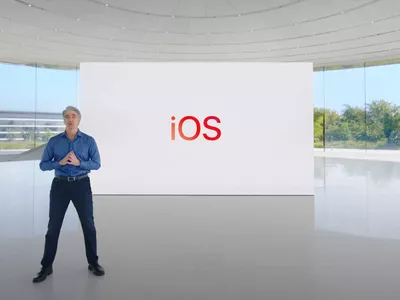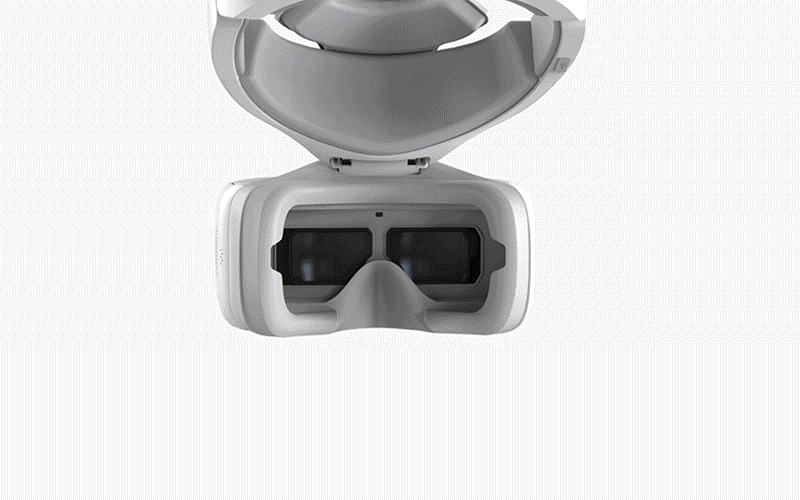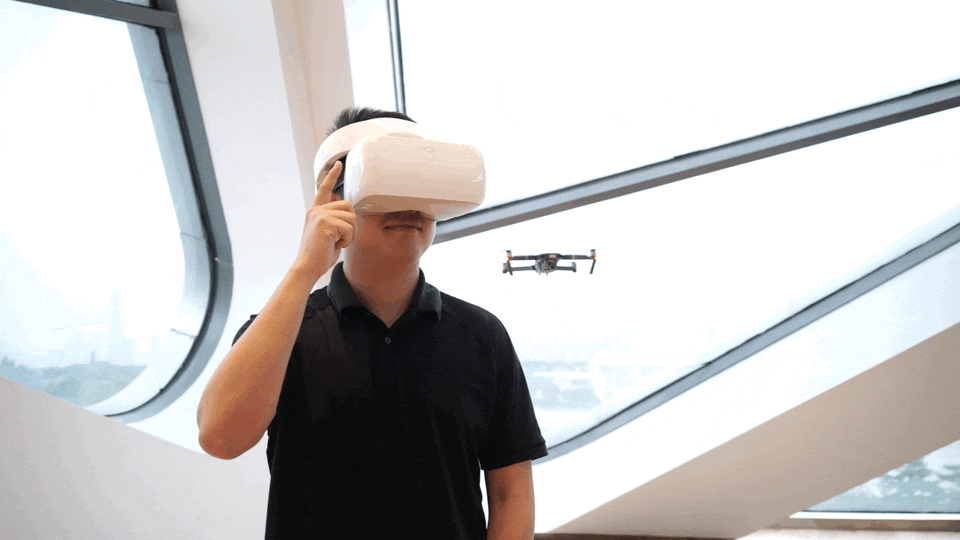
"The DJI FPV Revolution A Review of Eyewear Innovation"

The DJI FPV Revolution: A Review of Eyewear Innovation
Review for DJI FPV Goggles

Max Wales
Mar 27, 2024• Proven solutions
Last year, DJI released Mavic Pro’s Foldable small unmanned aerial vehicles, which has a mini body capable of being fit into the camera bag with awesome flight power. And it supports 4K real-time video transmission from up to 2 km away. It has almost compacted every sensor in Phantom 4 inside Mavic Pro. It is an excellent choice for small unmanned aerial vehicles (From 24th May, the best choice is DJI Spark). However, the public has not officially seen an accessory that was revealed in the conference. This is DJI Goggles – a first person perspective FPV flying glasses that has resolution comparable to VR glasses. Now, it is finally online on DJI website . The price is $499 and is available for purchase on 20th May.
Design
DJI Goggles can be split into two parts - headband and display module.
The display module has two 5” 1080O LED display, DJI cleverly position the display screen on the back and top of the display module.

Image resource: DJI Official Site
The display module composes of a power button, touchpad, return key, Fn key, IPD adjustment knob and HDMI, several commonly used interface of Micro SD card. All the keys are aligned on the right-hand side of the display, which allows you to operate it with one hand conveniently.
Wearing experience:
- The fixation level of the headband is related with the user’s head type
- The feeling of [top heavy] is obvious.
- When using head trackingfeature, the goggles have a risk of falling off.
Compatible products for DJI Goggles
Available on Mavic Pro, Phantom 4 Advanced, Professional, Inspire 2, etc.
| | image viewing | video viewing | Latency | |
| ——————— | ————- | ——————— | —– |
| Mavic Pro | 720p/60 fps | 720p/120fps | 110ms |
| Phantom 4 ProAdvanced | 720p/60 fps | 720p/60 fps or 120fps | 150ms |
| Phantom 4 | 720p/30 fps | 720p/60 fps | 167ms |
| Inspire 2 + X5S | 720p/60 fps | 1080p/120fps | 140ms |
| Inspire 2 + X4S | 720p/60 fps | 1080p/60fps | 190ms |
Moreover, DJI Goggles can be connected to a computer, PS4 for watching videos and gaming. But, regarding to experience…the same budget can allow you to purchase 28” 4K display.
Main features and experience
Head Tracking
#1. What is Head Tracking
Like remote controller sticks, you can now use head movements to control both aircraft yaw and camera tilt in Head Tracking Flight mode. You can simply control turn left or right to yaw left or right, and straighten your head to stop turning. In Head Tracking Gimbal mode, you will not affect the jaw as only the gimbal will move.
#2. Experience: Fun but not very practical
In the past, an unmanned drone is always separated by a mobile phone no matter how high the resolution of the graphic is. Now, you can have the image transmission directly displayed in your eyes. Through head tracking, you can achieve a similar effect to that of VR. It is very interesting.
But, in my opinion, these head tracking remains in a stage where it is only for playing once in a while, it is unlikely to be used in photo shooting mission for the long term. Here are the reasons:
- Frame rate is slightly lower, there are delays
Mavic’s OcuSync image transmission works perfect on iPad, but it indeed caused dizziness on DJI Goggles.
To reduce the effect of dizziness, the ideal number of frames rate of Goggles is 120fps. PSVR’s 90 fps had caused a lot of complaints. But, with DJI Goggles, this number is lowered to the lowest 30fps. With 110s image transmission delay, any head rotation at any point will make anyone feel dizzy.
- Too sensitive
The mission of 3-axis gimbal is to remove any camera shakes and stabilize the footage. But, the DJI Goggles’ head tracking actually bring back these shakes which do not come from the camera itself, but as a result of the commands of head tracking.
Tapfly
#1. What is Tapfly
With the integration of touchpad into DJI Goggles or 5D button on the Mavic Pro controller, users can access to key intelligent features. This makes navigating the internal menu system simple and intuitive.

Image resource: DJI Official Site
#2. Experience
DJI Goggles’s main interaction needs to be done through the touchpad. This touchpad supports swipe and clicks of single and double fingers. It is responsive to unusual speed. Sometimes it is too sensitive that occasionally, a swipe will be misunderstood as a click. In the case of a fault in touch, we can use double fingers to slide back to lock the touchpad.
Conclusion
As DJI’s first generation digital image transmission FPV goggles, I think it has a lot of room for improvement. Although Many software issues and hardware design still need to be improved, I think it worth to try.

Max Wales
Max Wales is a writer and a lover of all things video.
Follow @Max Wales
Max Wales
Mar 27, 2024• Proven solutions
Last year, DJI released Mavic Pro’s Foldable small unmanned aerial vehicles, which has a mini body capable of being fit into the camera bag with awesome flight power. And it supports 4K real-time video transmission from up to 2 km away. It has almost compacted every sensor in Phantom 4 inside Mavic Pro. It is an excellent choice for small unmanned aerial vehicles (From 24th May, the best choice is DJI Spark). However, the public has not officially seen an accessory that was revealed in the conference. This is DJI Goggles – a first person perspective FPV flying glasses that has resolution comparable to VR glasses. Now, it is finally online on DJI website . The price is $499 and is available for purchase on 20th May.
Design
DJI Goggles can be split into two parts - headband and display module.
The display module has two 5” 1080O LED display, DJI cleverly position the display screen on the back and top of the display module.

Image resource: DJI Official Site
The display module composes of a power button, touchpad, return key, Fn key, IPD adjustment knob and HDMI, several commonly used interface of Micro SD card. All the keys are aligned on the right-hand side of the display, which allows you to operate it with one hand conveniently.
Wearing experience:
- The fixation level of the headband is related with the user’s head type
- The feeling of [top heavy] is obvious.
- When using head trackingfeature, the goggles have a risk of falling off.
Compatible products for DJI Goggles
Available on Mavic Pro, Phantom 4 Advanced, Professional, Inspire 2, etc.
| | image viewing | video viewing | Latency | |
| ——————— | ————- | ——————— | —– |
| Mavic Pro | 720p/60 fps | 720p/120fps | 110ms |
| Phantom 4 ProAdvanced | 720p/60 fps | 720p/60 fps or 120fps | 150ms |
| Phantom 4 | 720p/30 fps | 720p/60 fps | 167ms |
| Inspire 2 + X5S | 720p/60 fps | 1080p/120fps | 140ms |
| Inspire 2 + X4S | 720p/60 fps | 1080p/60fps | 190ms |
Moreover, DJI Goggles can be connected to a computer, PS4 for watching videos and gaming. But, regarding to experience…the same budget can allow you to purchase 28” 4K display.
Main features and experience
Head Tracking
#1. What is Head Tracking
Like remote controller sticks, you can now use head movements to control both aircraft yaw and camera tilt in Head Tracking Flight mode. You can simply control turn left or right to yaw left or right, and straighten your head to stop turning. In Head Tracking Gimbal mode, you will not affect the jaw as only the gimbal will move.
#2. Experience: Fun but not very practical
In the past, an unmanned drone is always separated by a mobile phone no matter how high the resolution of the graphic is. Now, you can have the image transmission directly displayed in your eyes. Through head tracking, you can achieve a similar effect to that of VR. It is very interesting.
But, in my opinion, these head tracking remains in a stage where it is only for playing once in a while, it is unlikely to be used in photo shooting mission for the long term. Here are the reasons:
- Frame rate is slightly lower, there are delays
Mavic’s OcuSync image transmission works perfect on iPad, but it indeed caused dizziness on DJI Goggles.
To reduce the effect of dizziness, the ideal number of frames rate of Goggles is 120fps. PSVR’s 90 fps had caused a lot of complaints. But, with DJI Goggles, this number is lowered to the lowest 30fps. With 110s image transmission delay, any head rotation at any point will make anyone feel dizzy.
- Too sensitive
The mission of 3-axis gimbal is to remove any camera shakes and stabilize the footage. But, the DJI Goggles’ head tracking actually bring back these shakes which do not come from the camera itself, but as a result of the commands of head tracking.
Tapfly
#1. What is Tapfly
With the integration of touchpad into DJI Goggles or 5D button on the Mavic Pro controller, users can access to key intelligent features. This makes navigating the internal menu system simple and intuitive.

Image resource: DJI Official Site
#2. Experience
DJI Goggles’s main interaction needs to be done through the touchpad. This touchpad supports swipe and clicks of single and double fingers. It is responsive to unusual speed. Sometimes it is too sensitive that occasionally, a swipe will be misunderstood as a click. In the case of a fault in touch, we can use double fingers to slide back to lock the touchpad.
Conclusion
As DJI’s first generation digital image transmission FPV goggles, I think it has a lot of room for improvement. Although Many software issues and hardware design still need to be improved, I think it worth to try.

Max Wales
Max Wales is a writer and a lover of all things video.
Follow @Max Wales
Max Wales
Mar 27, 2024• Proven solutions
Last year, DJI released Mavic Pro’s Foldable small unmanned aerial vehicles, which has a mini body capable of being fit into the camera bag with awesome flight power. And it supports 4K real-time video transmission from up to 2 km away. It has almost compacted every sensor in Phantom 4 inside Mavic Pro. It is an excellent choice for small unmanned aerial vehicles (From 24th May, the best choice is DJI Spark). However, the public has not officially seen an accessory that was revealed in the conference. This is DJI Goggles – a first person perspective FPV flying glasses that has resolution comparable to VR glasses. Now, it is finally online on DJI website . The price is $499 and is available for purchase on 20th May.
Design
DJI Goggles can be split into two parts - headband and display module.
The display module has two 5” 1080O LED display, DJI cleverly position the display screen on the back and top of the display module.

Image resource: DJI Official Site
The display module composes of a power button, touchpad, return key, Fn key, IPD adjustment knob and HDMI, several commonly used interface of Micro SD card. All the keys are aligned on the right-hand side of the display, which allows you to operate it with one hand conveniently.
Wearing experience:
- The fixation level of the headband is related with the user’s head type
- The feeling of [top heavy] is obvious.
- When using head trackingfeature, the goggles have a risk of falling off.
Compatible products for DJI Goggles
Available on Mavic Pro, Phantom 4 Advanced, Professional, Inspire 2, etc.
| | image viewing | video viewing | Latency | |
| ——————— | ————- | ——————— | —– |
| Mavic Pro | 720p/60 fps | 720p/120fps | 110ms |
| Phantom 4 ProAdvanced | 720p/60 fps | 720p/60 fps or 120fps | 150ms |
| Phantom 4 | 720p/30 fps | 720p/60 fps | 167ms |
| Inspire 2 + X5S | 720p/60 fps | 1080p/120fps | 140ms |
| Inspire 2 + X4S | 720p/60 fps | 1080p/60fps | 190ms |
Moreover, DJI Goggles can be connected to a computer, PS4 for watching videos and gaming. But, regarding to experience…the same budget can allow you to purchase 28” 4K display.
Main features and experience
Head Tracking
#1. What is Head Tracking
Like remote controller sticks, you can now use head movements to control both aircraft yaw and camera tilt in Head Tracking Flight mode. You can simply control turn left or right to yaw left or right, and straighten your head to stop turning. In Head Tracking Gimbal mode, you will not affect the jaw as only the gimbal will move.
#2. Experience: Fun but not very practical
In the past, an unmanned drone is always separated by a mobile phone no matter how high the resolution of the graphic is. Now, you can have the image transmission directly displayed in your eyes. Through head tracking, you can achieve a similar effect to that of VR. It is very interesting.
But, in my opinion, these head tracking remains in a stage where it is only for playing once in a while, it is unlikely to be used in photo shooting mission for the long term. Here are the reasons:
- Frame rate is slightly lower, there are delays
Mavic’s OcuSync image transmission works perfect on iPad, but it indeed caused dizziness on DJI Goggles.
To reduce the effect of dizziness, the ideal number of frames rate of Goggles is 120fps. PSVR’s 90 fps had caused a lot of complaints. But, with DJI Goggles, this number is lowered to the lowest 30fps. With 110s image transmission delay, any head rotation at any point will make anyone feel dizzy.
- Too sensitive
The mission of 3-axis gimbal is to remove any camera shakes and stabilize the footage. But, the DJI Goggles’ head tracking actually bring back these shakes which do not come from the camera itself, but as a result of the commands of head tracking.
Tapfly
#1. What is Tapfly
With the integration of touchpad into DJI Goggles or 5D button on the Mavic Pro controller, users can access to key intelligent features. This makes navigating the internal menu system simple and intuitive.

Image resource: DJI Official Site
#2. Experience
DJI Goggles’s main interaction needs to be done through the touchpad. This touchpad supports swipe and clicks of single and double fingers. It is responsive to unusual speed. Sometimes it is too sensitive that occasionally, a swipe will be misunderstood as a click. In the case of a fault in touch, we can use double fingers to slide back to lock the touchpad.
Conclusion
As DJI’s first generation digital image transmission FPV goggles, I think it has a lot of room for improvement. Although Many software issues and hardware design still need to be improved, I think it worth to try.

Max Wales
Max Wales is a writer and a lover of all things video.
Follow @Max Wales
Max Wales
Mar 27, 2024• Proven solutions
Last year, DJI released Mavic Pro’s Foldable small unmanned aerial vehicles, which has a mini body capable of being fit into the camera bag with awesome flight power. And it supports 4K real-time video transmission from up to 2 km away. It has almost compacted every sensor in Phantom 4 inside Mavic Pro. It is an excellent choice for small unmanned aerial vehicles (From 24th May, the best choice is DJI Spark). However, the public has not officially seen an accessory that was revealed in the conference. This is DJI Goggles – a first person perspective FPV flying glasses that has resolution comparable to VR glasses. Now, it is finally online on DJI website . The price is $499 and is available for purchase on 20th May.
Design
DJI Goggles can be split into two parts - headband and display module.
The display module has two 5” 1080O LED display, DJI cleverly position the display screen on the back and top of the display module.

Image resource: DJI Official Site
The display module composes of a power button, touchpad, return key, Fn key, IPD adjustment knob and HDMI, several commonly used interface of Micro SD card. All the keys are aligned on the right-hand side of the display, which allows you to operate it with one hand conveniently.
Wearing experience:
- The fixation level of the headband is related with the user’s head type
- The feeling of [top heavy] is obvious.
- When using head trackingfeature, the goggles have a risk of falling off.
Compatible products for DJI Goggles
Available on Mavic Pro, Phantom 4 Advanced, Professional, Inspire 2, etc.
| | image viewing | video viewing | Latency | |
| ——————— | ————- | ——————— | —– |
| Mavic Pro | 720p/60 fps | 720p/120fps | 110ms |
| Phantom 4 ProAdvanced | 720p/60 fps | 720p/60 fps or 120fps | 150ms |
| Phantom 4 | 720p/30 fps | 720p/60 fps | 167ms |
| Inspire 2 + X5S | 720p/60 fps | 1080p/120fps | 140ms |
| Inspire 2 + X4S | 720p/60 fps | 1080p/60fps | 190ms |
Moreover, DJI Goggles can be connected to a computer, PS4 for watching videos and gaming. But, regarding to experience…the same budget can allow you to purchase 28” 4K display.
Main features and experience
Head Tracking
#1. What is Head Tracking
Like remote controller sticks, you can now use head movements to control both aircraft yaw and camera tilt in Head Tracking Flight mode. You can simply control turn left or right to yaw left or right, and straighten your head to stop turning. In Head Tracking Gimbal mode, you will not affect the jaw as only the gimbal will move.
#2. Experience: Fun but not very practical
In the past, an unmanned drone is always separated by a mobile phone no matter how high the resolution of the graphic is. Now, you can have the image transmission directly displayed in your eyes. Through head tracking, you can achieve a similar effect to that of VR. It is very interesting.
But, in my opinion, these head tracking remains in a stage where it is only for playing once in a while, it is unlikely to be used in photo shooting mission for the long term. Here are the reasons:
- Frame rate is slightly lower, there are delays
Mavic’s OcuSync image transmission works perfect on iPad, but it indeed caused dizziness on DJI Goggles.
To reduce the effect of dizziness, the ideal number of frames rate of Goggles is 120fps. PSVR’s 90 fps had caused a lot of complaints. But, with DJI Goggles, this number is lowered to the lowest 30fps. With 110s image transmission delay, any head rotation at any point will make anyone feel dizzy.
- Too sensitive
The mission of 3-axis gimbal is to remove any camera shakes and stabilize the footage. But, the DJI Goggles’ head tracking actually bring back these shakes which do not come from the camera itself, but as a result of the commands of head tracking.
Tapfly
#1. What is Tapfly
With the integration of touchpad into DJI Goggles or 5D button on the Mavic Pro controller, users can access to key intelligent features. This makes navigating the internal menu system simple and intuitive.

Image resource: DJI Official Site
#2. Experience
DJI Goggles’s main interaction needs to be done through the touchpad. This touchpad supports swipe and clicks of single and double fingers. It is responsive to unusual speed. Sometimes it is too sensitive that occasionally, a swipe will be misunderstood as a click. In the case of a fault in touch, we can use double fingers to slide back to lock the touchpad.
Conclusion
As DJI’s first generation digital image transmission FPV goggles, I think it has a lot of room for improvement. Although Many software issues and hardware design still need to be improved, I think it worth to try.

Max Wales
Max Wales is a writer and a lover of all things video.
Follow @Max Wales
Also read:
- [Updated] 2024 Approved Private Chronicles in Snapchat An Essential Guide
- [Updated] How to Use Creative Commons Copyright Licenses [Complete Guide] for 2024
- A Comprehensive Introduction to Color Grading with LUTs
- How to Fix 'Windows Update Failed' With Error 0X8007001F Successfully
- In 2024, Change Location on Yik Yak For your Nokia C300 to Enjoy More Fun | Dr.fone
- Master Guide for Selecting TikTok Wallpapers
- Record-Breaking Reddit Threads Ranked 1-10
- Solving the Problem of Your Laptop's Unresponsive Trackpad
- Sticker Removal Strategies for TikTok Content
- The Ultimate Review of the Netgear Nighthawk AC3200 – Tri-Band Excellence Meets Household Harmony
- Top 8 Best Video Converter on iPhone/Desktop for 2024
- Troubleshooting Windows 7 Speaker Problems: A Step-by-Step Guide
- Title: The DJI FPV Revolution A Review of Eyewear Innovation
- Author: Paul
- Created at : 2025-03-05 20:39:00
- Updated at : 2025-03-06 22:45:10
- Link: https://extra-information.techidaily.com/the-dji-fpv-revolution-a-review-of-eyewear-innovation/
- License: This work is licensed under CC BY-NC-SA 4.0.